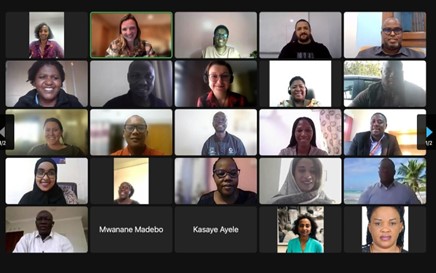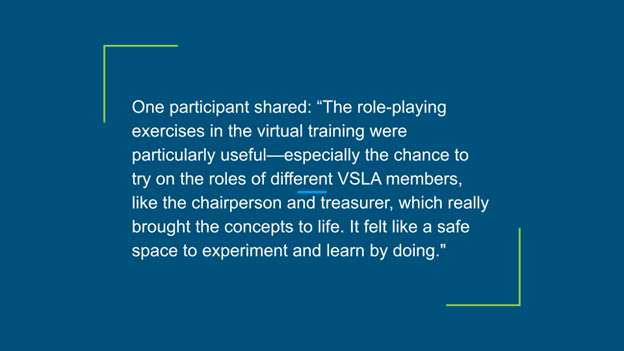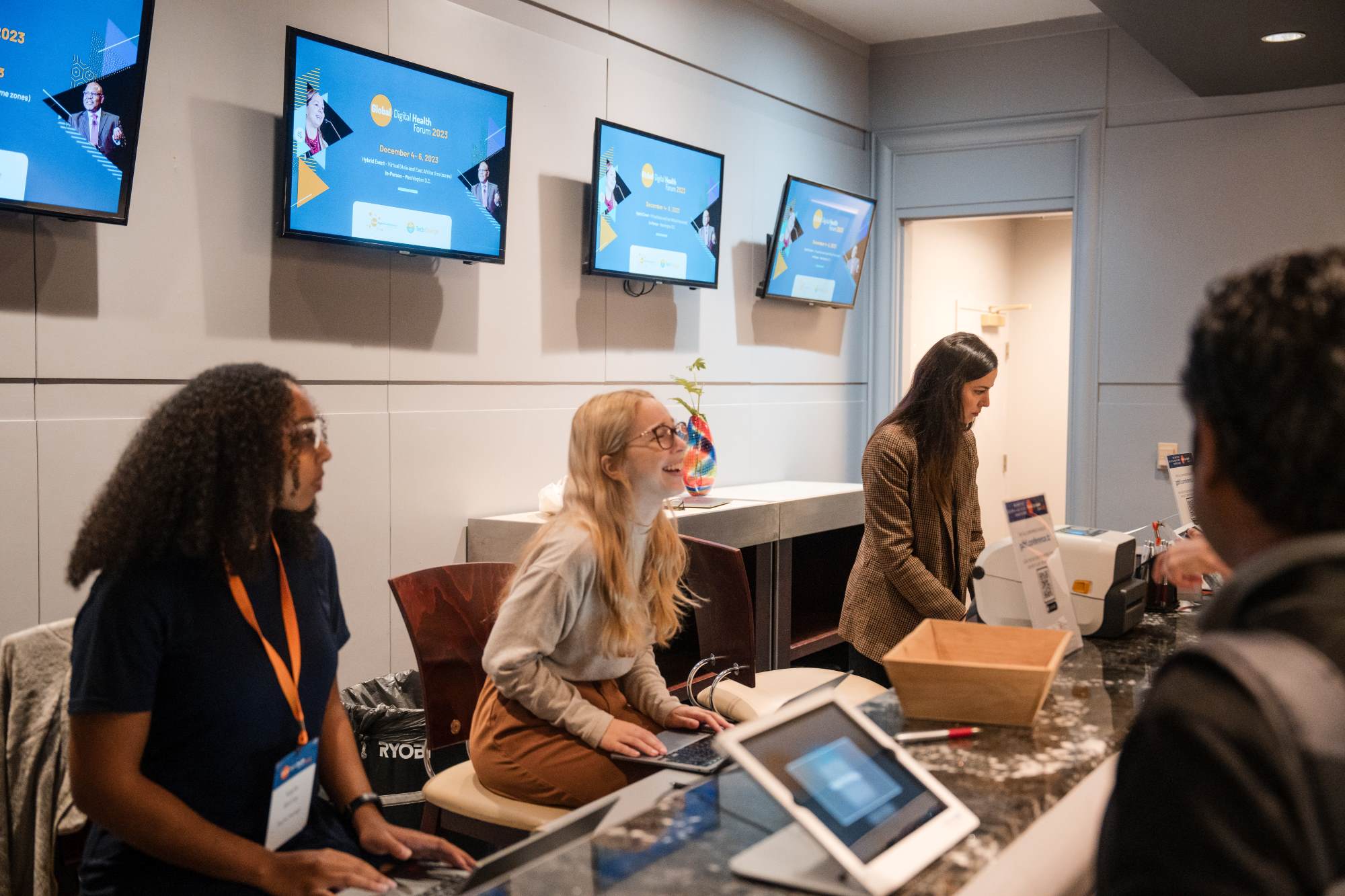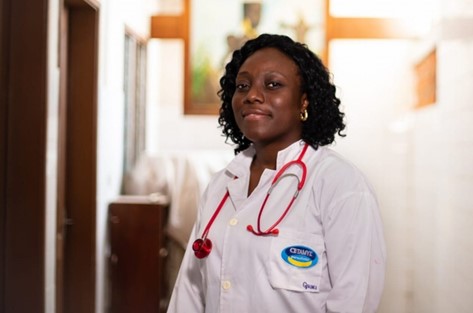By Kalkidan Lakew Yihun, Program Coordinator for CARE Women Respond Initiative and Morgan Meyer, TechChange Senior Manager for Education
A well-done Training of Trainers (TOT) is an effective way to boost the relevance, sustainability, and long-term impact of international development training programs. But in-person they are often high-touch, costly endeavors that require travel and a great deal of resources, from the convening organizations and participants. Can it be done online, while still giving participants the expert facilitation skills and content they need, now and for the future?
This year, CARE partnered with the digital training and events firm TechChange to successfully evolve what was once a five-day in-person training to a five-week blended learning experience for participants from every major region.
VSLA Model for Financial Stability
CARE’s Village Savings and Loan Associations approach provides people–mostly women–
in remote, rural, or low-income communities access to financial services such as savings, loans with interest, and access to social funds (an informal microinsurance) ordinarily reserved for social events and emergencies. These valuable programs offer tools for financial stability and mobility for those who wouldn’t otherwise have it.
The impact for beneficiaries are far reaching: small business creation, negotiating fair prices, advocating for gender equality in their communities, and even pursuing public office. VSLAs go beyond supporting financial inclusion, by engaging women and communities to address root causes of gender inequality.
VSLAs are powerful entry points and platforms for women to achieve increased confidence, negotiation and communication skills, improved agency and self-efficacy to support a range of outcomes across all aspects of their lives from improved health, increased market access, leadership and economic resilience. Through VSLAs, CARE has reached close to twenty million people in 64 countries.
TOT Equips Trainers with Needed Skills
In addition to the technical skills related to the VSLA methodology, trainers who work with the VSLAs must have expert knowledge of adult learning pedagogy, financial and life skill education delivery, and the community contexts in which they operate.
The CARE VSLA TOT addresses these needs through in-depth modules on each phase of a VSLA roll-out, all relevant financial concepts, and conflict management, along with extensive role-play scenarios such as introducing the concept and benefits of a VSLA to community members. These role-play scenarios give trainers real-time opportunities to learn effective communication and delivery of material, practice customizing content based on context, fitting for the cultural, social and religious context of the community– and learn from and with other trainers through each stage of the VSLA methodology.
For example, participants practice acting as “gatekeepers,” or community members such as local leaders or husbands, that would have to agree to women’s participation in the VSLA, in order to better emphasize with all stakeholders and hone their advocacy skills.
From In-Person to Virtual and Accessible
Historically, the VSLA TOT has been a five-day, in person training where VSLA trainers deliver the sessions, and then continue to mentor trained staff. The CARE Global VSLA team wanted to take the successes of the in-person model and build it into a more cost-effective model for sustainability, including building the ability for new actors to form VSLAs.
CARE team content and program experts worked with TechChange instructional designers to take the existing training material and build it into a five week online course, delivered as a cohort-based blended learning experience with asynchronous elements. These once a week, three-hour live sessions with all participants from Africa, Asia, and Latin America covered main topic areas and provided live, instructor-led opportunities to practice the skills covered in the TOT, including simulations and role plays just like previous participants had the opportunity to do in the in-person TOTs.
In between sessions, participants completed self-paced study on relevant modules to prepare for the next week’s meeting. A robust discussion board and weekly assignments through the interactive TechChange platform helped to keep everyone engaged.
Closing out the first cohort
The first cohort completed the blended TOT in June 2024, closing out the session with high attendance and positive feedback. According to the TOT post survey, 100% of participants were satisfied with the quality of the course. 90% of participants strongly agreed that the ToT improved their ability to effectively explain the VSLA Methodology, its benefits and have a deep understanding of the VSLA process. When asked if they would recommend this ToT to others, 100% of participants answered “yes, absolutely.” One participant referred to the technical support and interactive activities as “the icing on the cake.”
After successfully completing the training, participants are certified by CARE to train and mentor Community Based Trainers (CBTs) to strengthen and expand VSLAs in their home territories.
This growth of capacity and knowledge will help CARE to scale the VSLA model more broadly to other local organizations, development organizations and governments throughout the world.
Additional Diversity Training
In addition to rolling out the pilot program of the VSLA TOT, CARE also worked with TechChange to formalize the internal diversity, equity, inclusion, and belonging training. TechChange’s instructional designers created a synchronous online course on these crucial topics, working with CARE’s DEBI Center of Excellence.
This course is meant to be taught live by trainers, so TechChange built an accompanying TOT, to train trainers in English, Spanish, French, and Arabic. Going forward, these trainers will train in all four of these languages, continuing the implementation of it as a synchronous program.
The VSLA TOT program will continue as well, learning from the successes of the pilot program, and past in-person versions, and improving in sustainability, relevance, and quality.
Working together, CARE and TechChange have seen that online learning tools paired with programmatic and technical expertise are a winning combination.





